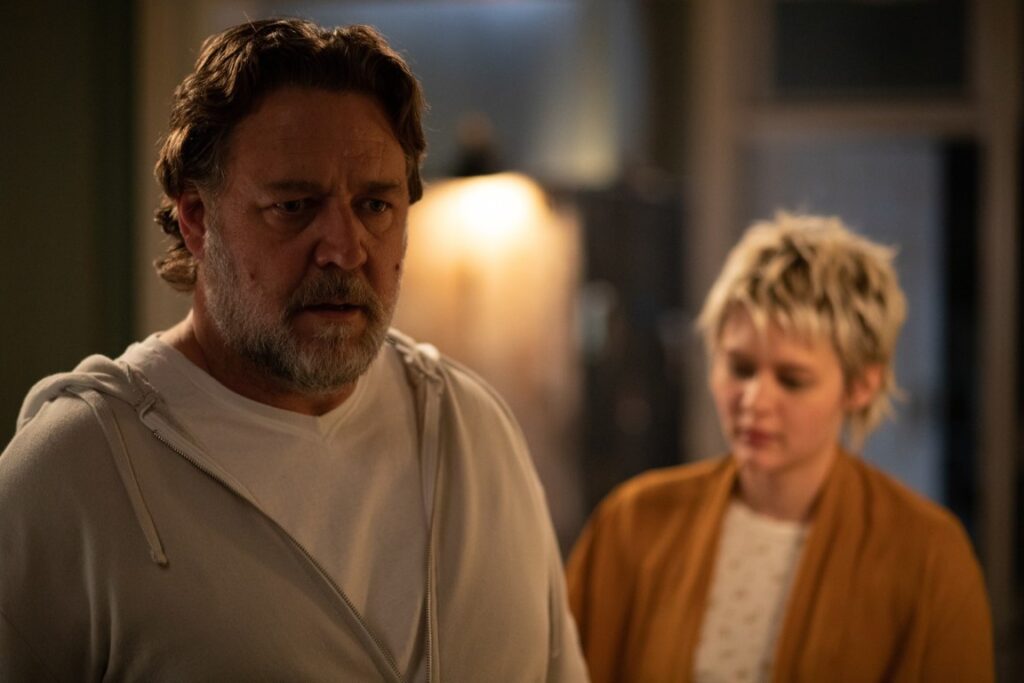The biggest challenge any director making an exorcism movie faces is: How do you top The Exorcist? William Friedkin’s apocalyptic, daring 1974 classic defined the genre so thoroughly that any subsequent entry is both indebted to, and haunted by, its mastery. The smartest move, really, is to just embrace its fog-covered shadow; The Exorcism, a meta-textual possession film that swims happily in the iconography of its forebear. In so doing it comes away with surprisingly melancholic ruminations on the strain that came with, well, making The Exorcist.
The film is co-written and directed by Joshua John Miller (Final Girls), whose most direct connection to The Exorcist comes from being the son of Jason Miller, the actor who played Father Karras in Friedkin’s original. In a way, this story feels like Miller exorcising demons of his own, likely spurred by watching the emotional toll his father experienced working on Friedkin’s famously chaotic and unpredictable set back in 1974. Here, the timeline is moved to the present, where a film called The Georgetown Project (a nod to the town in which The Exorcist is set) is put on hold after the actor playing the priest (a brief turn from Adrian Pasdar) meets a grisly fate late one night in the film’s doll-house like soundstage.
In desperation, the film’s director (Adam Goldberg) turns to Anthony Miller (Russell Crowe), a washed-up movie star freshly sober and looking for his way back into the spotlight. In an early scene of confession — a perpetually useful device for Catholic-flavored exposition — we learn that Miller is a lapsed Catholic whose life has been haunted by childhood sexual abuse as an altar boy. This itself rippled out into drug and alcohol problems and a strained relationship with his daughter Lee (Ryan Simpkins), who comes home after washing out of college just in time for Miller to contemplate a return to screen.

It’s a heady gumbo of Catholic guilt, decades of trauma, and the constant reminder of a failed father-daughter relationship that keeps The Exorcism‘s surprisingly terrestrial drama afloat in its early stretches. Miller’s direction is suitably atmospheric, but grounded in a kind of showbiz drama about a Method actor getting a bit too close to the role; save for the spooky-ooky prelude, Miller tempts us with the enticing idea of an possession film where the demons truly come only from within.
Crowe, for his part, is fantastic as always; it’s tempting to compare this to his recent jaunt in the priest robes from last year’s riotous The Pope’s Exorcist (this was filmed before that one, to be fair), but the demands of each role are deliciously dissimilar. Where Father Amorth was a blustering devil-demolisher with a thick Italian accent and a Columbo-like sense of elan, Tony Miller (note the surname) is a brittle man barely holding it together. He’s Father Merrin and Father Karras all rolled into one, world-weary from decades of grief and pain and terrified to tap into those agonies for fear they’ll rot him from the inside. The more he channels those memories, the better his performance gets — and the more something else begins to take hold. Is it Method acting gone awry? Or something that only Lee and the Catholic priest brought on to consult (a reserved, compelling David Hyde Pierce) can save him from?
Indeed, The Exorcism leans into that idea for quite some time. Tony’s grip on reality dovetails with the horrible memories and sensations he forces himself to revisit for the part. But the longer the film goes, the more it veers into the kind of sensationalism a movie like this innately demands; horror audiences, after all, wouldn’t be all that satisfied with, as Goldberg’s director pretentiously prattles early on, “a psychological thriller in the skin of a horror film.” And so it goes with the blackened eyes, the scarred faces, the floating bodies, and contorting limbs, not to mention the vulgarities spat at loved ones in a demonic rattle. There’s comfort in the familiarity, but the climax feels rushed once we tip over the scales into true supernaturalism.

These are minor gripes in a film that’s fascinatingly reflective not just on The Exorcist and its impact on the horror genre but on Method acting as a consumptive tool for performance and Crowe’s own caterwauling career as an actor. Tony, like Crowe, is an older A-lister no longer making the prestige pictures he used to; they’re both haunted by past transgressions, waiting for younger Aussies to take their place in the pecking order (Sam Worthington crops up as a handsome protege and co-star, much like he was groomed in the late aughts to be “the next Russell Crowe”).
Outside of Crowe, The Exorcism loses a bit of steam, especially as Miller caterwauls between soft-spoken self-reflection from Crowe and Simpkins and brief flashes of horror imagery. For all their talent, Simpkins doesn’t get enough room or grace in the script to stand out once they have to shoulder the burden of the story; Lee’s queerness feels relegated to the background, aside from a somewhat sweet romance between her and another member of the Georgetown set (Chloe Bailey) and one particularly nasty rebuke that escapes Tony’s mouth at the height of his distress. The film’s broader criticisms of the church’s approach to sexuality, whether through molestation from the clergy or its rejection of homosexuality, feel buried in the background amid Miller’s own history (as a gay filmmaker who wrote this script with his partner, M.A. Fortin).
Even so, something compels about The Exorcism‘s metatextual allure, whether as a companion piece to The Exorcist or The Pope’s Exorcist or any similar thriller about a method actor losing himself in the part. It’s not quite a possession picture, nor is it a story of a crumbling star amid a crumbling production. But in the bouncing between these two modes, a frisson develops between Miller’s crisp direction and Crowe’s always-committed performance, resulting in something that, Exorcist fan or no, can’t help but take hold of you.
The Exorcism is in theaters now.
The Exorcism Trailer:
Read next: The Spool's Best New Releases
Streaming guides
The Best Live TV Streaming Services With Free Trial
The praises of live TV streaming services don’t need to be further sung. By now, we all know that compared to clunky, commitment-heavy cable, live TV is cheaper and much easier to manage. But just in case you’re still on the fence about jumping over to the other side, or if you’re just unhappy with ... The Best Live TV Streaming Services With Free Trial
How to Watch Power Book III: Raising Kanan Season 3
Season 3 of the hotly anticipated Power spin-off, Power Book III: Raising Kanan, is arriving on Starz soon, so you know what that means: it’s the ’90s again in The Southside, and we’re back with the Thomas family as they navigate the ins and outs of the criminal underworld they’re helping build. Mekai Curtis is ... How to Watch Power Book III: Raising Kanan Season 3
How to Watch Doctor Who: 60th Anniversary Specials
Ladies and gentlemen, we’re so back! To celebrate Doctor Who’s 60th anniversary, the BBC is producing a three-episode special starring none other than the Tenth/Fourteenth Doctor himself, David Tennant. And to the supreme delight of fans (that would be me, dear reader), the Doctor will be joined by old-time companion Donna Noble (Catherine Tate) and ... How to Watch Doctor Who: 60th Anniversary Specials
Which Netflix Country has Interstellar?
Maybe you’ve just seen Oppenheimer and have the strongest urge to marathon—or more fun yet, rank!—all of Christopher Nolan’s films. Or maybe you’re one of the few who haven’t seen Interstellar yet. If you are, then you should change that immediately; the dystopian epic is one of Nolan’s best, and with that incredible twist in ... Which Netflix Country has Interstellar?
Which Netflix Country Has Each Movie of The Hunger Games?
For whatever reason, The Hunger Games series isn’t available in the same countries around the world. You’ll find the first and second (aka the best) installments in Hong Kong, for instance, but not the third and fourth. It’s a frustrating dilemma, especially if you don’t even have a single entry in your region, which is ... Which Netflix Country Has Each Movie of The Hunger Games?
How to Watch ESPN With A Free Trial
One of the major concerns people have before cutting the cord is potentially losing access to live sports. But the great thing about live TV streaming services is that you never lose that access. Minus the contracts and complications of cable, these streaming services connect you to a host of live channels, including ESPN. So ... How to Watch ESPN With A Free Trial
How to Watch Paramount Network With a Free Trial
To date, Paramount Network has only two original shows on air right now: Yellowstone and Bar Rescue. The network seems to have its hands full with on-demand streaming service Paramount+, which is constantly stacked with a fresh supply of new shows. But Yellowstone and Bar Rescue are so sturdy and expansive that the network doesn’t ... How to Watch Paramount Network With a Free Trial
How to Watch WE TV With a Free Trial
Previously “Women’s Entertainment,” We TV has since rebranded to accurately reflect its name and be a more inclusive lifestyle channel. It’s home to addictive reality gems like Bold and Bougie, Bridezillas, Marriage Boot Camp, and The Untold Stories of Hip Hop. And when it’s not airing original titles, it has on syndicated shows like 9-1-1, ... How to Watch WE TV With a Free Trial
How to Watch TNT Sports With A Free Trial
For many sports fans, TNT is a non-negotiable. It broadcasts NBA, MLB, NHL, college basketball, and All Elite Wrestling matches. And, as a bonus, it also has reruns of shows like Supernatural, Charmed, and NCIS, as well as films like The Avengers, Dune, and Justice League. But while TNT used to be a cable staple, ... How to Watch TNT Sports With A Free Trial
How to Watch Comedy Central With a Free Trial
It’s no coincidence that many of today’s biggest comedians found their footing on Comedy Central: the channel is a bastion of emerging comic talents. It served as a playground for people like Nathan Fielder (Fielder For You), Ilana Glazer and Abbi Jacobson (Broad City), Tim Robinson (Detroiters), and Dave Chappelle (Chappelle’s Show) before they shot ... How to Watch Comedy Central With a Free Trial
How to Watch FX With a Free Trial
You’d be hard-pressed to find a bad show airing on FX. The channel has made a name for itself as a bastion of high-brow TV, along with HBO and AMC. It’s produced shows like Atlanta, Fargo, The Americans, Archer, and more recently, Shogun. But because it’s owned by Disney, it still airs several blockbusters in ... How to Watch FX With a Free Trial